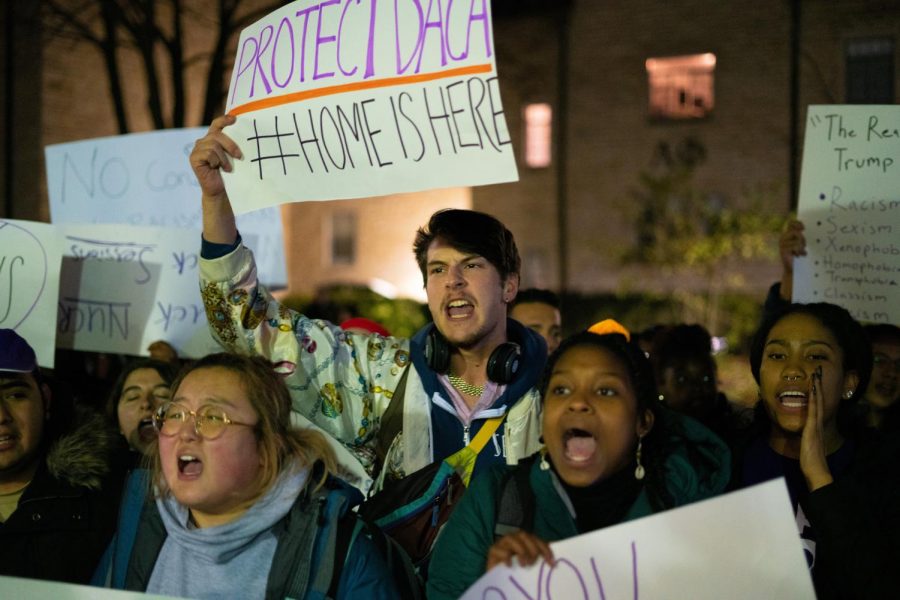by Ashna Satpathy, Staff Reporter
On November 5th, when students at Northwestern University geared up to protest a speech by Jeff Sessions on their campus, hardly anyone could have anticipated that it would lead a worldwide debate over campus free speech and the rights of journalists.
Following the protest, Northwestern’s student-run newspaper, The Daily Northwestern, reported on the event. Included in their article were photos of the protesters, many of which angered people as they believed that the photos were published without their consent, and were an invasion of privacy. After receiving considerable backlash, The Daily Northwestern published an apology letter, signed by Troy Closson, the paper’s editor in chief and a student at the university’s Medill School of Journalism, and seven other editors.
This letter received more criticism than the reporting itself. Journalists from around the world criticized the newspaper for apologizing for what newspapers ought to do: take pictures of events and report on them. Many remarked that it is the duty of a journalist to be authentic and show the public what is going on, and by sugar-coating it or omitting certain facts and pictures, journalists move away from that idea. Also, there is an accepted notion that if one has put themselves in the public domain, by protesting or partaking in any public activities, they have consented to be photographed. As such, a journalist does not need any permission or consent from the subject in order to publish their photographs in support of an article.
Many argue that because the protesters were members of marginalized communities, they needed a safe space to protest. In today’s age, how does one distinguish between what is a safe space and what is free to the press? At what point is the notion of free speech trivialized by the restrictions of the public’s feelings? Is protecting students from reality really helping them to grow up and face the world?? This is a case where there was almost universal agreement that the publication was wrong in issuing an apology.
The dean of Northwestern’s Medill School of Journalism, Charles Whitaker, issued a lengthy statement on the controversy: “The coverage by The Daily Northwestern of the protests… was in no way beyond the bounds of fair, responsible journalism,” Whitaker said. “The Daily Northwestern is an independent, student-run publication. I am deeply troubled by the vicious bullying and badgering that the students responsible for that coverage have endured for the ‘sin’ of doing journalism.”
In response to the controversy, Sean Malaiserie, a 2018 Latin graduate and current sophomore at Northwestern University, said, “I saw on Facebook that there were a lot of alumni and a lot of undergrads criticizing The Daily” and “I don’t think there’s anything wrong with it, they’re doing their job.” He also noted that “it was a protest in a public space, they knew what they were getting into, I think most people on campus would say that.” Contrariwise, he believes, “most people are overly sensitive and there’s definitely a lot of sheltered people there.”
Rashail Wasim, a junior at Latin, believes “the whole point of protesting is to give public visibility to what you see as an injustice—it makes no sense that they are opposed to journalists covering them at all. The protesters can’t expect absolute privacy when they are trying to get a message out to the public.”
Similarly, junior Betsy Levine says, “I think that the paper should generally write with empathy in regards to how and what they’re reporting. But, in this specific instance, I think that it was the paper’s right through the freedom of the press to cover the story as to spread awareness of the event and the following protests because in the end, it’s the newspaper’s job to spread the news.”
Put simply, people are slowly becoming more and more aware of others’ feelings. The criteria of what is considered offensensive is, however, expanding. Many feel that they are not allowed to express themselves at the risk of being scorned. Although it is important that everyone be mindful of others, it is also important that we do not lose sight of the first amendment. Discourse of opinions and the right to express what you feel is perhaps one of the greatest parts of American society. The sheltering of newspapers can, perhaps, lead to the demise of a complex society with a diversity of opinions.
Categories:
Safe Spaces vs. Freedom of the Press: Northwestern University Caught in the Crosshairs
December 2, 2019
1
0

















































Robert Igbokwe • Dec 4, 2019 at 8:33 pm
This is a wonderfully written article, Ashna!! 🙂 🙂 I think an important issue to acknowledge is not just how the role of the press is being skewed but also how the role of protests is being distorted. The power behind a protest is the people’s willingness to face consequences for their cause. It’s a collection of people saying: I care so much about this cause that I am willing to be defamed, even arrested to defend it. These students’ outrage over such a silly consequence shows a serious issue in how they understand their right to protest.